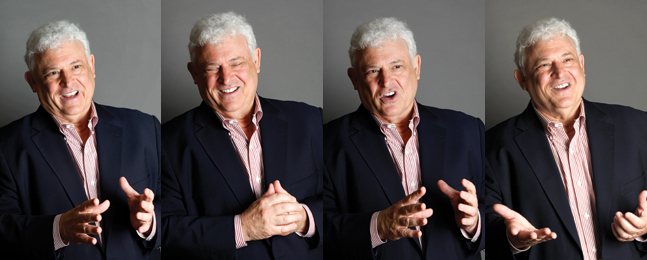The Brandeis Questionnaire
Arthur Caplan '71

Mike Lovett
Making the right call is rarely easy.
Especially when you’re trying to make principled decisions in science or medicine, with technology evolving minute by minute, and matters of life and death at hand. That’s when you really need someone who can walk you along unfamiliar terrain, sort through confusion and pinpoint the ethical thing to do.
For many, that guide is Arthur Caplan, the Drs. William F. and Virginia Connolly Mitty Professor at New York University’s School of Medicine and founding head of the school’s Division of Medical Ethics, which fosters bioethics knowledge among doctors and society at large.
The author or editor of 32 books and more than 600 papers in peer-reviewed journals, Caplan writes a regular column on bioethics for NBC.com and is a monthly commentator for WebMD/Medscape.
Major media outlets keep him on speed dial. Recently in The Washington Post, for example, he reflected on doctors who espouse anti-vaccination beliefs (“they shouldn’t be allowed near patients, let alone TV cameras”). In U.S. News, he discussed the drug companies that have stopped selling lethal-injection drugs to death-penalty states (their action is “leading to abandonment of capital punishment”). In The Wall Street Journal, he eviscerated scientists who insist human head transplants are viable (“the whole idea is ridiculous”).
Caplan, who earned his MA, MPhil and PhD from Columbia, was named one of the 10 Most Influential People in the Sciences by Discover Magazine in 2008. Last year, the National Science Board/National Science Foundation conferred another huge honor, giving Caplan its Public Service Award for serving as “a trailblazer in raising awareness about the ethical questions that accompany scientific and technological advances.” This summer, Scientific American named him one of the 100 Most Influential People in Biotechnology; he is the only ethicist on the list.
A fan of rock ’n’ roll bands from the Kinks to Foo Fighters, this trailblazer tackles all manner of questions, the high-minded to the lowbrow, with his characteristic quick wit and good humor.
Asked on “Boston Public Radio” in June whether skinny jeans — which can restrict circulation in the legs — should come with a warning label, he said, “Art Caplan hasn’t been into a pair of skinny jeans … in a long time. Let’s put it that way.”
What was your idea of perfect happiness when you were at Brandeis?
In no particular order: Going to a Cream concert. Playing intramural football. Arguing politics. Hanging out with my friends from freshman year (who are still my friends 40-plus years later). Trying to solve linguistics problems. Away lacrosse games. Talking with other students about Vietnam, civil rights, feminism, gay rights and why I thought we should all vote for Hubert Humphrey for president. Snowball fights. Visiting philosophy professor Robert Greenberg’s home and seeing how an academic could enjoy a career. Afternoon cocktails with the provost. Summer trips to Europe.
When or where were you most miserable at Brandeis?
When I was drafted, lottery number 30, during mandatory conscription. I hated the war. I hoped I might draw a medical exemption due to allergies — and I did, from a sympathetic doctor. I knew my high-school friends who had not gone to college and lacked connections to doctors and lawyers were surely going to Vietnam. For the first time, I felt the power and inequity of class personally.
Who was your favorite Brandeis professor?
Many. Robert Greenberg, Henry Aiken and Morris Weitz, from philosophy. Samuel Jay Keyser, linguistics. John Roche, political science.
Where did you usually spend Saturday night?
Partying or studying — 50/50.
If you could be any other Brandeisian, who would it be?
My friend Grover Gilmore ’71, now a dean in applied social sciences at Case Western. Smart, ethical and a genuinely nice person.
What is the most important value you learned at Brandeis?
Respect for others, and respect for the opinions of others.
What was the most important shortcut you learned in college?
Start projects early; you will finish faster.
Which talent did Brandeis help you develop most?
How to organize and present an argument.
If you could go back to college, what would you do differently?
Nothing. I loved my time at Brandeis, although a little more studying first semester would have been salubrious.
What would your friends say is your greatest strength?
Calm in a crisis.
What would your friends say is your greatest weakness?
Too devoted to my work.
What is your blind spot?
Budgets — don’t like to do them, but they have to be done.
What movie changed your life?
“To Kill a Mockingbird.” Second place: “On the Waterfront.”
Whom would you like to sing a duet with?
I can’t sing, but if I could, Tom Petty.
Which deadly sin is your middle name?
A bunch of them. But I am still working on all of them.
If you could climb into a time machine, whom would you like to hang out with?
Ben Franklin — polymath, moralist, inventor, diplomat, genius, flirt and absolutely a fun guy.
On your deathbed, what will you be most grateful for?
My wife, Meg, and my son, Zach.
What three words of advice would you give to current Brandeis students?
Don’t back down.
